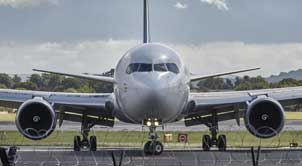A Guide to Aluminum Use in the Aerospace Industry
Last fall, we examined the extensive role aluminum plays in the aerospace industry and how its unique properties provide abundant benefits for aircraft applications. The use of aluminum enables manufacturing companies to satisfy stringent aerospace standards at lower costs.
When compared with steel, another important material used for aerospace applications, the advantages of aluminum are apparent.
While steel is used for applications where strength is essential, aluminum provides important benefits that cannot be achieved with steel. Aluminum is lighter in weight, provides excellent corrosion resistance and delivers the strength required for many aircraft components.
Aluminum Alloys Engineered for the Aerospace Industry
 Several aluminum alloys were specifically engineered for use in the aerospace industry.
Several aluminum alloys were specifically engineered for use in the aerospace industry.
The following alloys were specially designed to meet the requirements of aircraft specifications:
- Aluminum Alloy 2014 — This alloy ranks among the strongest heat treatable products available. It combines excellent strength with good machinability. Aluminum 2014 is one of the easiest aluminum alloys to weld and it performs well with arc and resistance welding methods. However, its corrosion resistance is limited. When exposure to the elements is anticipated, alloy 2014 should be clad with pure aluminum or painted for protection. Alloy 2014 is an excellent forging alloy for aircraft parts such as landing gears and hydraulic cylinders.
- Aluminum Alloy 2219 — Another high-strength option, Aluminum Alloy 2219 is heavily relied upon for applications that require maximum toughness at elevated temperatures. Alloy 2219 is frequently utilized for structural aerospace components — this alloy was used to produce the external tank for the original space shuttle — as it maintains excellent mechanical properties and machinability in the annealed condition. It is also weldable but it should be heat treated after welding to maintain its corrosion resistance.
- Aluminum Alloy 7475 — Developed by the Alcoa, Aluminum Alloy 7475 is most often used in high performance aerospace applications that require high resistance to fracture. Providing uncompromising strength and crack fatigue resistance, Alloy 7475 offers the industry’s best fracture toughness. It can also be readily formed and machined in the annealed condition, with improved forming available by heating the alloy to 250°F. It has been frequently used for components such as wing spars, wing skins, and fuselage bulkheads.
- Aluminum Alloy 7178 — The primary alloying elements in Aluminum Alloy 7178 are magnesium and copper, making this alloy another solid choice for high-strength applications. Its toughness has made it a sought-after material for aircraft skins, particularly for protecting components that must undergo compressive stress. This alloy is easier to machine when used with oil lubricants, offering significant improvement in mechanical properties seen with precipitation hardening. Precipitation heat treatment is achieved at temperatures of 250°F for 24 hours to produce tempers of T6 and T651.
Continental Steel and Tube Company is a leading distributor of aerospace aluminum alloys. We are well-known for our excellent quality, customer service, and reliable deliveries and we’re qualified to source a wide array of hard-to-find materials. For more information or to request a quote, please contact us today.

